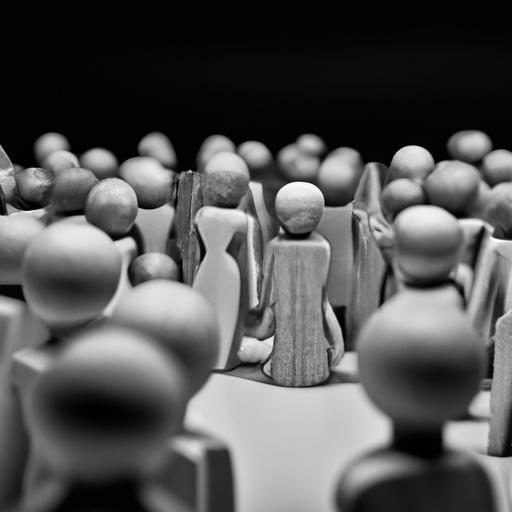Do you ever wonder why it seems like people just don’t like you? It’s like you’re standing on the outskirts of a bustling party, watching everyone else have a great time while you struggle to connect. It can be a frustrating and lonely experience. But have you ever considered that your own habits might be pushing people away? In this article, we will explore some common behaviors that may make you unlikeable. From a lack of empathy and understanding, to a negative attitude and constant complaining, to poor listening skills and being self-centered, these habits can create barriers between you and others. By identifying and addressing these behaviors, you can start building stronger, more genuine connections with the people around you.
Key Takeaways
- Lack of empathy and understanding can lead to difficulties in connecting with others and can result in misunderstandings and conflicts.
- Having a negative attitude and constantly complaining pushes people away and makes you unlikeable, while cultivating a positive mindset attracts healthier relationships.
- Poor listening skills hinder your ability to connect with people, and actively listening and responding appropriately shows value and fosters trust.
- Being self-centered and insensitive creates an atmosphere of disrespect, while shifting the focus from yourself to others and being more sensitive can improve relationships.
Lack of Empathy and Understanding

If you lack empathy and understanding, people may find it difficult to connect with you on a deeper level. Emotional intelligence and connection play a crucial role in building meaningful relationships. When you lack empathy, you struggle to understand and share the feelings of others. This can lead to misunderstandings, conflicts, and a general sense of disconnect. Research has shown that empathy is a key component of emotional intelligence, which is essential for effective communication and building strong connections with others.
Cultivating compassion and kindness is an important step towards developing empathy and understanding. By actively practicing compassion, you can train yourself to be more aware of others’ emotions and experiences. This involves actively listening to others, putting yourself in their shoes, and responding with empathy. Kindness, on the other hand, involves treating others with respect, consideration, and generosity. Both compassion and kindness contribute to creating an environment where people feel understood and valued.
Developing empathy and understanding takes time and effort, but it is a skill that can be learned and improved upon. By consciously practicing empathy and cultivating compassion and kindness, you can deepen your connections with others and create more meaningful relationships.
Negative Attitude and Complaining

Having a negative attitude and constantly complaining can push people away and make you unlikeable. When you constantly engage in self-pity and adopt a victim mentality, it not only drains your own energy but also brings down those around you. Constant criticism and negativity create a toxic environment that people naturally want to avoid.
Here is a table that highlights the impact of a negative attitude and constant complaining on your relationships:
| Negative Attitude and Complaining | Impact on Relationships |
|---|---|
| Self-pity and victim mentality | Makes you appear needy and self-absorbed. It becomes exhausting for others to constantly validate and reassure you. |
| Constant criticism | Creates a negative atmosphere and erodes trust. Others may feel judged and criticized, leading to strained relationships. |
| Negativity | Drains energy and enthusiasm from social interactions, making them less enjoyable for everyone involved. It can also bring down the mood of the entire group. |
Research shows that people are naturally drawn to positivity and individuals who uplift and inspire others. By cultivating a more positive mindset and focusing on solutions rather than dwelling on problems, you can become more likable and attract healthier relationships.
Poor Listening Skills

To be more likable, it is important to improve your listening skills and actively engage in conversations with others. Poor listening skills can greatly hinder your ability to connect with people and make them feel valued. One common habit that makes you unlikeable is interrupting conversations. When you constantly interrupt others, it sends a message that you believe your thoughts and opinions are more important than theirs. This can be frustrating and disrespectful to the person speaking, making them feel unimportant and unheard.
Another habit that contributes to poor listening skills is not showing genuine interest. When you fail to show genuine interest in what someone is saying, it is easy for them to perceive you as disinterested or uncaring. This can create a barrier and prevent meaningful connections from forming. People want to feel heard and understood, and by actively listening and showing genuine interest, you can make others feel valued and respected.
By improving your listening skills, you can become a more likable person. Active listening involves giving your full attention, maintaining eye contact, and responding appropriately to what others are saying. This shows that you value their thoughts and opinions, fostering a sense of trust and connection.
Transitioning into the subsequent section about being self-centered and insensitive, it is important to note that poor listening skills can contribute to these negative traits. When you are not actively listening, you may come across as self-centered and insensitive, as you are more focused on yourself rather than the needs and concerns of others.
Being Self-Centered and Insensitive

Improve your likability by shifting your focus from yourself to others and being more sensitive to their needs and feelings. Being self-centered and insensitive can greatly affect how others perceive you and may contribute to people disliking you. Here are some key behaviors to avoid if you want to be more likable:
-
Lack of consideration: When you consistently prioritize your own needs and desires without considering how they may impact others, it can make you come across as self-absorbed and uncaring. Taking the time to show empathy and understanding towards others can go a long way in building positive relationships.
-
Ignoring others’ perspectives: People appreciate it when their opinions and viewpoints are acknowledged and respected. By dismissing or disregarding what others have to say, you create an atmosphere of disrespect and alienation. Make an effort to actively listen to others and consider their perspectives, even if they differ from your own.
-
Self-centered conversations: Constantly steering conversations towards yourself and your own experiences can make others feel left out and unimportant. Remember to ask others about their lives, actively listen, and show genuine interest in what they have to say.
-
Lack of sensitivity towards others’ emotions: Being insensitive to the emotions and feelings of others can make you seem cold and unfeeling. Show empathy and compassion by acknowledging and validating the emotions of those around you.
-
Lack of gratitude and appreciation: Failing to express gratitude and appreciation for the efforts and kindness shown by others can make them feel unvalued and unimportant. Take the time to acknowledge and thank others for their contributions and support.
Frequently Asked Questions
How Can Lack of Empathy and Understanding Affect My Relationships?
Lacking empathy and understanding can greatly impact your relationships. Without these qualities, you may struggle to connect with others, leading to misunderstandings, conflict, and a lack of trust. Building strong relationships requires genuine compassion and the ability to see things from others’ perspectives.
What Are Some Common Signs of a Negative Attitude and Complaining That May Make Me Unlikeable?
Constantly criticizing others and having a pessimistic outlook are common signs of a negative attitude and complaining that may make you unlikeable. These behaviors can push people away and create a negative atmosphere.
How Can Poor Listening Skills Impact My Interactions With Others?
Poor listening skills can negatively impact your interactions with others by hindering effective communication. Active listening enhances personal connections, fosters understanding, and builds strong relationships. It shows that you value and respect the other person’s thoughts and feelings.
What Are Some Examples of Self-Centered and Insensitive Behaviors That May Push People Away?
You may not realize it, but some habits can push people away. Narcissistic tendencies can strain relationships, while being oblivious to others’ feelings can have consequences. It’s important to be mindful of these behaviors.
Can Being Aware of These Habits and Making an Effort to Change Them Improve My Likability?
Being aware of and making an effort to change self-centered and insensitive habits can improve your likability. Building genuine connections through authenticity and vulnerability and developing social skills, such as effective communication and building rapport, can enhance your likability.
Conclusion
In conclusion, it is important to be aware of the habits that may make you unlikeable. Lack of empathy and understanding, a negative attitude, poor listening skills, and being self-centered and insensitive can all contribute to others not liking you. By recognizing and addressing these behaviors, you can improve your relationships and become a more likable person. Remember, "You catch more flies with honey than with vinegar."


Leave a Reply